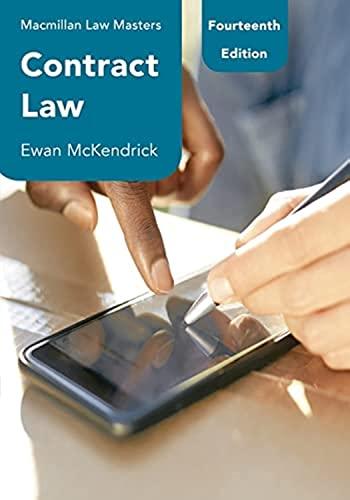Question
In 1963, the U.S. Court of Claimsestablished ruleknown as the Christian Doctrine, which provides thatcertain mandatory contract clauses are incorporated, by law, into an otherwise
In 1963, the U.S. Court of Claimsestablished ruleknown as the "Christian Doctrine," which provides thatcertain mandatory contract clauses are incorporated, by law, into an otherwise validly awarded contract, even if the contracting agency accidentally omits that clause from the solicitation. Over the past 60 years, the "Christian Doctrine," has been used to imply various mandatory, but omitted, contract clauses into federal contracts.
However, in a protest decision in 2016,the Government Accountability Office (GAO) held that while theChristian Doctrinecan be used to imply a mandatory clause into a contract, it cannot be used to imply a mandatory clause into a solicitation.
Inthis case, the protestor argued that the Government's award of a contract formaintenance center equipment services was improper because the winner's proposal violated the requirements ofFAR clause 52.219-14, Limitations on Subcontracting (which, for services contracts, requires the prime contractorto self-performat least 50 percent of the cost of the contract). Because the RFP at issue was a small business set-aside, FAR 52.219-14 should have been included in the RFP. However, for some reason,the RFP did not incorporate FAR 52.219-14. The protester argued that even though the RFP omittedFAR 52.219-14, the clause was incorporated into the RFP by operation of law, pursuant to the Christian Doctrine.
GAO rejected this argument:
This assertion is without merit. The "Christian Doctrine" provides only for incorporation by law of certain mandatory contract clauses into otherwise validly awarded government contracts; it does not stand for the proposition that provisions are similarly incorporated, by law, into solicitations.
1. Do you think the GAO ruling is fair?
2. The ruling suggests that the Government may be moving away from the Christian Doctrine. Would that be a good or bad thing.
3. If you were authorized to rule in favor of the protester what would your argument be? You can use narrative or bullet points but your answer should be complete and well defended.
Step by Step Solution
There are 3 Steps involved in it
Step: 1

Get Instant Access to Expert-Tailored Solutions
See step-by-step solutions with expert insights and AI powered tools for academic success
Step: 2

Step: 3

Ace Your Homework with AI
Get the answers you need in no time with our AI-driven, step-by-step assistance
Get Started


